

BHFNC - Exercise Referral Toolkit - Downloads. Terms of use The aim of this toolkit is to provide an easy-to-read, practical guide for all those professionals involved in the delivery, coordination, commissioning and evaluation of exercise referral schemes.
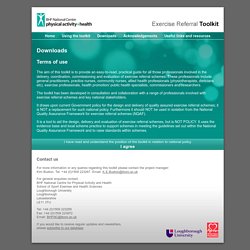
These professionals include general practitioners, practice nurses, community nurses, allied health professionals (physiotherapists, dieticians etc), exercise professionals, health promotion/ public health specialists, commissioners and researchers. The toolkit has been developed in consultation and collaboration with a range of professionals involved with exercise referral schemes and key national stakeholders.
It draws upon current Government policy for the design and delivery of quality assured exercise referral schemes; it is NOT a replacement for such national policy. Furthermore it should NOT be used in isolation from the National Quality Assurance Framework for exercise referral schemes (NQAF). National Trust to help councils fund parks - LocalGov. Thomas Bridge 23 March 2015 A new plan from the country’s biggest landowner is understood to involve joint working with town halls to establish sustained financial support for public parks.
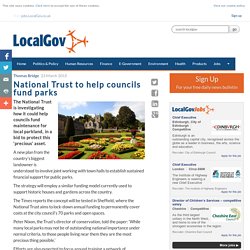
The strategy will employ a similar funding model currently used to support historic houses and gardens across the country. The Times reports the concept will be tested in Sheffield, where the National Trust aims to lock-down annual funding to permanently cover costs at the city council’s 70 parks and open spaces. Peter Nixon, the Trust’s director of conservation, told the paper: ‘While many local parks may not be of outstanding national importance under normal criteria, to those people living near them they are the most precious thing possible.’
Littering in Britain: We need a campaign to change behaviour - Home News - UK - The Independent. This is what has happened with litter.
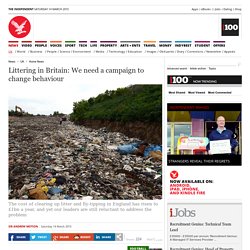
Despite our heroes, the cost of clearing up litter and fly-tipping in England has risen to £1bn a year. And yet our leaders are still reluctant to address the problem. Do they think it’s OK to waste a billion pounds of taxpayers’ money every year? With only 2,000 convictions out of 825,000 reported cases of fly-tipping, it’s little wonder the vandals are confident they will get away with it – just like the motorists who chuck their rubbish out of the car window rather than taking it home.
Landscape Institute. The Natural Capital Committee (NCC) has launched its third report into the state of natural capital in England.
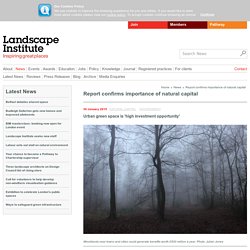
The NCC, established in 2012 as an independent body, provides advice to Government on how to ensure England’s ‘natural wealth’ is managed efficiently and sustainably. The report emphasises that carefully planned investments in natural capital will deliver significant value for money and generate large economic returns. Urban green space is highlighted as just one of the ‘high return investment opportunities’, with the report stating its potential to reduced health treatment costs by £2.1 billion. Urban parks, trails are cost-effective ways to promote exercise. A new systematic review in the American Journal of Health Promotion finds that providing public parks and walking and biking trails is the most cost-effective strategy to increase physical activity among large populations in urban areas.
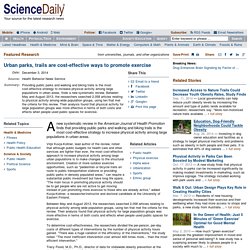
Virpi Kuvja-Kollner, lead author of the review, noted that although public budgets for health care and other services are tighter than ever, the most cost-effective approach to increase physical activity among large urban populations is to make changes to the structural environment. Creation of more outdoor exercise opportunities, such as "pedestrian or bicycle trails en route to public transportation stations or providing public parks in densely populated areas," can require a substantial public investment but have long life spans.
Between May and August 2013, the researchers searched 2,058 articles relating to physical activity among wide population groups, using ten that met the criteria for this review. Coir Rolls in the Living Went Project. In July we are planning to start one of the major aspects of the Living Went project: installing just under 2km of coir rolls in the banks of the Went and its tributaries.
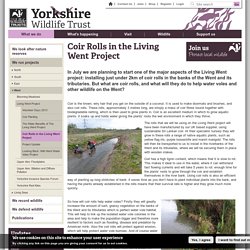
But what are coir rolls, and what will they do to help water voles and other wildlife on the Went? Coir is the brown, wiry hair that you get on the outside of a coconut. It is used to make doormats and brushes, and also coir rolls. These rolls, approximately 3 metres long, are simply a mass of coir fibres bound together with biodegradable netting, which is then used to grow plants in. Would you pay a new tax to live next to a park? Ministers are examining proposals to invite residents who live next to a park to pay a tax that reflects the boost to their house prices from pleasant green spaces.
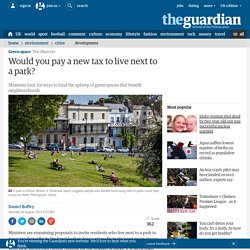
With local authorities cutting funding for the upkeep of parks, it is recognised that new sources of funding are needed to avoid a trend seen in the 1970s and 1980s where some parks deteriorated into wastelands with high rates of crime. A report from the Policy Exchange thinktank proposes a hypothecated levy, separate from council tax, to be paid by people who live near parks and benefit from their maintenance or regeneration. The thinktank, whose former directors include business minister Nick Boles and George Osborne's special adviser Neil O'Brien, recognises that it would be politically difficult to introduce such a charge.
Log Piles – Creating a Flourishing Wildlife Community — Creative STAR Learning. In recent years the old-fashioned log pile has been superceded by the hip and trendy mini beast hotels in school grounds.
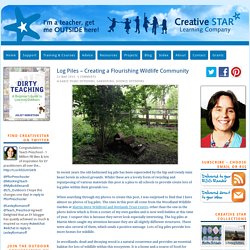
Whilst these are a lovely form of recycling and repurposing of various materials this post is a plea to all schools to provide create lots of log piles within their grounds too. When searching through my photos to create this post, I was surprised to find that I have almost no photos of log piles. The ones in this post all come from the Woodland Wildlife Garden at Martin Mere Wildfowl and Wetlands Trust Centre, other than the one in the photo below which is from a corner of my own garden and is now well-hidden at this time of year. I suspect this is because they never look especially interesting. The log piles at Martin Mere caught my attention because they are all slightly different structures. Natural England’s Green Infrastructure Guidance - NE176. How to design communities that make residents fitter and healthier.
The obesity epidemic is a huge and growing issue for the UK.
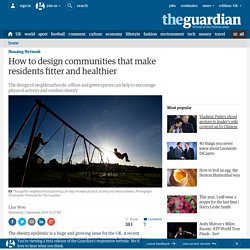
A recent parliamentary report shows most physical activity occurs during everyday activities within the built environment, rather than during leisure or sport. The design of neighbourhoods, towns and green spaces is critical to increasing physical activity. But, how would this work? Every community will have a different answer, but principally they need to increase opportunities for active travel, encourage active movement in buildings such as schools and offices, and improve quality and consistency of routes for residents.
This will help communities to reach good quality, well-designed open spaces with access to local public facilities such as healthcare. Act for Nature: Calls for new law to support recovery of nature and improve people's wellbeing. Image credit: Matthew Roberts Charities are today challenging political parties to ‘act for nature’ by introducing new laws to restore nature and increase everyone’s access to it, not only for nature’s sake but also for the contribution it makes to people’s health and wellbeing.
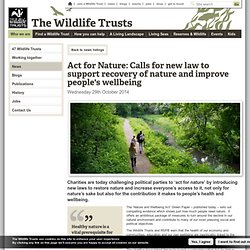
Healthy nature is a vital prerequisite for our long term health, wealth and security The ‘Nature and Wellbeing Act’ Green Paper – published today – sets out compelling evidence which shows just how much people need nature. Parks Alliance formed to stand up for sector. Plans to build an alliance to tackle the funding crisis facing public parks took a significant step forward last week as a cross-sector group of parks and allied representatives gathered in London to agree the next steps for the initiative including the creation of a transitional board. Nearly 40 key sector executives from across the UK discussed the way forward at the second Parks Leadership Round Table, hosted by Horticulture Week. NFPGS_standing_up_for_our_green_spaces.pdf. NFPGSwayforwardforfriendsmovement2.2014.pdf. Green Space. An opportunity for change: Exploring the Trust option for parks and green space services Having engaged with a range of organisations that are directly delivering high quality green spaces management as a Trust, this guide by GreenSpace provides a practical guide to the feasibility stage of establishing a Trust.
Abridged versionFull version Impact of the Comprehensive Spending Review (2011) This study, targeted at local authority green space teams, on the brink of agreeing their annual budget for 2011/2012, seeks to examine the following:In terms of budgets and service commitment, are green space services being treated equitably? Green Infrastructure Partnership, October News. Parks-and-green-space-management-plans.pdf.
Microeconomic Evidence for the Benefits of Investment in the Environment 2 (MEBIE2) - NERR057. Green Society: Policies to improve the UK’s green spaces. Local authorities should consider rewarding people who volunteer their time to clean up and maintain their local parks, allotments and cemeteries with council tax rebates. Our report highlights the importance of parks and other urban green spaces to the social and economic wellbeing of the country. Providing free outdoor space for exercise, socialising and relaxation, parks can benefit both physical and mental health.
However, on average local authority spending on open spaces was cut by 10.5% between 2010/11 and 2012/13 and there is no ring-fence protecting the budget spent on maintaining green spaces. Would you pay a new tax to live next to a park?